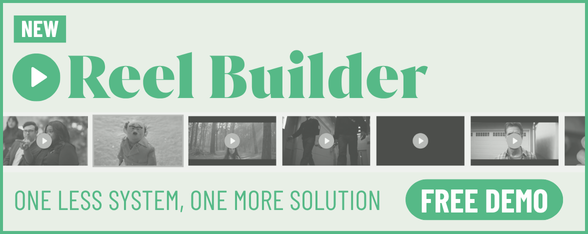
Meet Your Makers: Evan Landry's Love of the Process Keeps him Hooked

Evan Landry is an award-winning producer, and an executive producer and the managing director at Asymetric - a creative production company, based in Toronto, Canada.
LBB> What first attracted you to production - and has it been an industry you’ve always worked on or did you come to it from another area?
Evan> I was always interested in film, but deviated a little along the way. I studied history and political science in University, and as graduation loomed, I realised I didn’t want a “normal” job. I loved Film and TV and had always enjoyed making unwatchable short films with friends and promo videos for clubs and events at University so instead of following my friends into Law School or Academia, I decided to try to get into the film industry. My Dad is an actor, and my Mom is an artist, so they were very supportive of me taking this route, even if my Dad still sometimes asks me “Don’t you ever want to get in front of the camera?”. No, Dad. I don’t.
LBB> What was your first role in the production world and how did this experience influence how you think about production and how you grew your career?
Evan> I worked as a volunteer PA on a music video. I handled playback of the song. What a rush. I worked a 15 hour day. They gave me a walkie-talkie, free food, and the AD only yelled at me a few times. I was hooked! I decided I was going to make it in this industry, and maybe if I worked hard, and played my cards right, I might get paid actual money at some point …
LBB> How did you learn to be a producer?
Evan> It was a combination of observing, asking endless questions and ultimately doing. I’ve been lucky to have some great mentors throughout my career. I also worked for a lot of different producers as I worked my way up through production, so I learned a lot by observing the producers I worked with. Watching other people do their jobs can be a great way to learn what to do, and sometimes what not to do. I also started producing music videos and short films well before I had any business doing so and it was an amazing training ground. Sink or swim. I’m also still learning every day — and I love that about the job.
LBB> Looking back to the beginning of your career, can you tell us about a production you were involved in where you really had to dig deep and that really helped you to grow as a producer?
Evan> I produced a music video for a massive artist in a very isolated location with no film infrastructure beyond a handful of sandbags and a couple of rusty c-stands. The job was plagued with bad luck from the start, and it felt like everything that could go wrong did go wrong, including getting stranded due to a natural disaster. Despite the adversity, we persevered, and the video actually turned out great and went on to win some awards. Although at one point I had been convinced that this might be the end of my career, it ultimately became a lesson, that as long as everyone is safe and healthy, there is a solution to every problem, and it will all be OK.
LBB> What’s your favourite thing about production and why?
Evan> Can I say craft services? No? Ok I’ll just make something up then…
It's immensely satisfying to shepherd a project from the idea phase through to delivery. Seeing a completed project that so much work has been put into is always rewarding. That being said, I love the whole process along the way - navigating all of the challenges from beginning to end. That’s key. You’ve got to love the process because ultimately that’s the job.
LBB> How has production changed since you started your career?
Evan> I started in 2010, and I think it’s a given that the biggest shifts have been in technology — both in how we make things and in how they’re consumed. Equipment has evolved so much, and volume walls are being used more and more. One of the big shifts driven by social media is that it feels like everything we’re making now is for multiple mediums. The asks for social content seem to increase every year and framing for multiple aspect ratios brings a unique set of challenges. It’s been really impressive to see how directors, DPs and production teams adapt to the increased asks and find new innovative ways to get the clients what the want. Ask me again in a few years and maybe you’ll get a response from an AI version of me …
LBB> And what has stayed the same?
Evan> Despite the consistent technological changes, it doesn’t feel like the true essence of production has changed at all. Film is such a collaborative medium — no matter what the project or era, it requires immense collaboration and teamwork in order to work towards a shared creative goal. If you look at the credits on any project, it’s always amazing to see the amount of people that have come together to make it happen.
LBB> What do you think is the key to being an effective producer - and is it something that’s innate or something that can be learned?
Evan> The basics can be taught to some extent, but I believe what separates a good producer from a great producer is largely intangible. The keys to being a great producer are some combination of the following, in no particular order, and it varies from person to person: Creativity. Steadfast willpower. Stubbornness. Flexibility. Finesse. Diplomacy. Perseverance. The ability to remain calm or at least appear calm. High tolerance for bullshit. Curiosity. Passion. Lack of Ego. Confidence. Patience. But above all, the most effective producers are ultimately the best problem solvers, and that can manifest itself in any number of ways.
LBB> Which production project from across your career are you most proud of and why?
Evan> It’s really tough to choose one, but for the sake of this I’ll go with a short film that I produced with director Peter Huang called 5 Films About Technology. It had quite a run for a short film — it premiered at TIFF, played at Sundance, sold around the world including Canal+ and The New Yorker, and was picked up by Neon in the US and released ahead of the feature film Colossal in over 1000 theatres. We went on to develop it into a TV series for FX/Hulu called Nine Films About Technology which we shot in Toronto during the height of the pandemic in 2020.
LBB> And in terms of recent work, which projects have you found to be particularly exciting or have presented particularly interesting production challenges?
Evan> We produce such a wide range of projects at Asymetric with so many fantastic directors and clients that it feels like there’s always something exciting or interesting about the work we’re doing. From shooting in a house in Toronto, to filming on a moving train in Slovenia, to shooting on a frozen lake in the Yukon, there’s always something unique about every project to get excited by, and each one comes with its own unique set of challenges. That’s one of the things I love so much about the job - every day is different.
LBB> Producers always have the best stories. What’s the hairiest / most insane situation you’ve found yourself in and how did you work your way out of it?
Evan> Ha! The best ones probably can’t be on the record. There have been a lot of insane situations — from lost equipment, to hurricanes, to being kicked out of locations, to getting lost in the Yukon without cell service, to having an actor handcuff themself to themself in a remote location — and I’ve worked my way through all of them with a combination of sheer will power, a healthy dose of luck, and a lot of great people (and a costume designer with a hairpin and a lot of ingenuity).
LBB> What are your personal ambitions or aspirations as a producer?
Evan> My aspirations are to keep making great work with great people, and always find new challenges and opportunities to grow as a producer. I realized early on in my career that if you’re not a little bit uncomfortable it probably means you’re stagnating and not moving forward.
LBB> As a producer your brain must have a neverending "to do" list. How do you switch off? What do you do to relax?
Evan> I’m not really familiar with either concept …
I’m kidding. It’s alcohol.
Also kidding — Compartmentalization is key. It’s important to be able to switch off and separate from work consistently, even if you love what you do. It was harder earlier in my career, but I’ve gotten a lot better at it and really see the positive benefits of it. In addition to a lot of little things here and there, at least once a year I try and go backcountry camping off the grid for at least a few days. Not having access to a phone and focusing on just your most basic needs is the ultimate reset.
LBB> What advice would you give to people who are interested in becoming a producer?
Evan> Make stuff! But also work for other producers and get as much experience as you can in different areas of production. Learn your craft. Work hard and learn as much as you can from as many people as you can. Be a sponge. Then take everything you’ve learned and apply it to your experience to shape your own unique POV as a producer. Then produce, produce, produce. Make as much as you can. Never stop being open to learning. If you think you know everything then you’re in trouble.
LBB> From your experience what are the ingredients for a successful production?
Evan> It’s a combination of detailed planning, assembling the right team for the project and working towards a shared creative goal, with strong leadership and some luck. For me it’s important to create a positive working environment. Creating the conditions, support and the right environment for creatives to do great work is key.
LBB> What’s the key to a successful production-client relationship?
Evan> Communication and transparency is key. Managing expectations — especially when working with challenging budgets — is absolutely crucial. Having everyone on the same page throughout really helps keep everyone happy and focused on the right things.
LBB> Producers are naturally hands on - they have to be. How do you balance that in the more managerial role of an EP?
Evan> I really try and give people the space to do their jobs. When I transitioned from line producing to EP’ing, I made it my goal not to micromanage as much as possible. It’s a lot easier when I’m confident in our production teams. It all starts with hiring the right people for the project, and putting together strong teams. We’re very calculated on a project by project basis when we assemble our team. We’re aware of the unique challenges of each project as well as the personalities of everyone involved. Chemistry is important. All that being said, sometimes I’m still very hands on when there’s space for it — I don’t think that will ever stop.
















